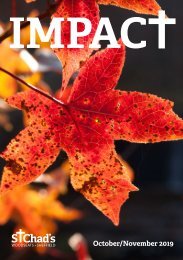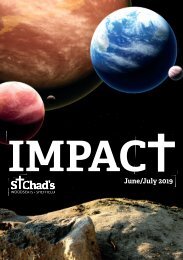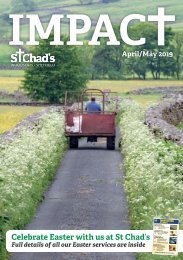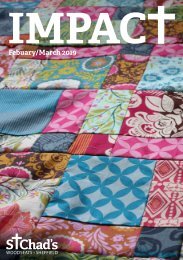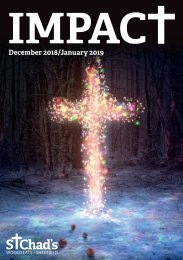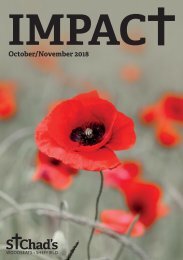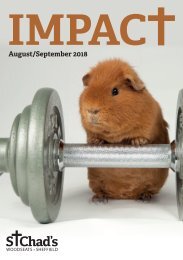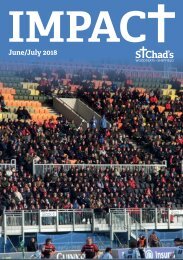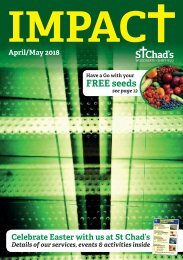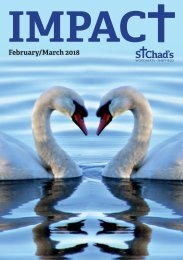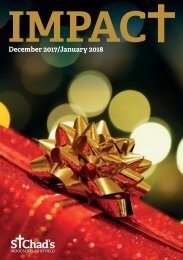2013-12
2013-12
2013-12
You also want an ePaper? Increase the reach of your titles
YUMPU automatically turns print PDFs into web optimized ePapers that Google loves.
When it comes to singing<br />
songbirds are nature’s real<br />
virtuosos. They possess a<br />
musical instrument more complex<br />
than anything in the orchestra.<br />
Known as the syrinx, it is the bird’s<br />
version of the voice box, or larynx,<br />
in humans. The syrinx has two<br />
pairs of vocal chords so songbirds<br />
can produce two notes at the same<br />
time. They routinely perform a feat<br />
equivalent to a musician playing two<br />
instruments at once while dancing.<br />
Not many humans can achieve that,<br />
although some opera singers might<br />
come pretty close.<br />
When we humans sing, we do it<br />
because we enjoy it and it makes it<br />
feel good, but to a bird his song is<br />
his life. He sings to attract a mate<br />
(and those with the best voices<br />
attract the most females – like pop<br />
stars today). He sings to defend<br />
his territory - song and display are<br />
meant to prevent a fight rather than<br />
provoke one. ‘Don’t even think about<br />
it,’ he says, ‘you’d be bound to lose,<br />
I’m the greatest!’ He also passes on<br />
his song to future generations.<br />
Watching birds sing, it is obvious<br />
that they enjoy it. Indeed scientists<br />
have found that chemical changes<br />
take place in the brain of a female<br />
nightingale as she listens to the<br />
male bird’s song. Similar changes<br />
take place in our brains when<br />
we sing and chemicals called<br />
endorphins are released which<br />
make us feel happy and elated.<br />
Singing also stimulates the memory<br />
and is used to help stroke survivors<br />
and people with dementia. These<br />
people, although unable to speak,<br />
can often sing complete songs from<br />
their youth, word and tune perfect.<br />
Charities like The Lost Chord and<br />
Mindsong work to help these people<br />
regain life and happiness.<br />
But the voice is a muscle, and,<br />
like all muscles, bird and human, it<br />
needs to be used and kept in tune.<br />
Fortunately this is enjoyable as well<br />
as good for us. Singing uses many<br />
muscles including the diaphragm<br />
(our bellows).<br />
The brain uses huge amounts of<br />
oxygen, burning more calories than<br />
the equivalent time spent in the gym<br />
and the controlled breathing helps<br />
clear our lungs and breathing tubes<br />
which is why asthmatics are often<br />
prescribed singing lessons.<br />
We humans, like birds, were<br />
designed to sing and so we have<br />
from Old Testament times. There<br />
are hundreds of references in the<br />
Bible to singing, dancing and musicmaking.<br />
The songs were written to<br />
be sung and many have headings<br />
such as ‘to the choir master’. King<br />
David, Jesus’ ancestor, was the<br />
greatest Psalm writer and he would<br />
not only have written the words but<br />
also compose the music. Although<br />
we might never know what these<br />
tunes sounded like it is possible that<br />
we still sing some of them today. For<br />
just as the blackbird sings the same<br />
song he sang 2,000 years ago, so<br />
much of our own music has been<br />
passed down through the centuries.<br />
Certainly the early Christians still<br />
sang the same songs Jesus sang<br />
in the temple and much of our own<br />
church music is well over 1,000<br />
years old. St Matthew tells us that<br />
after the Last Supper the final thing<br />
Jesus did before setting out to face<br />
his last ordeal was to sing a hymn<br />
with his friends (Matthew 26:30). Is<br />
it not possible that we know the tune<br />
and still sing it today?<br />
Here are some lines from a prayer<br />
by Eddie Askew:<br />
“Lord, I know your song<br />
I want to make it my own<br />
A pilgrim song which takes me on<br />
my way.<br />
I’ll sing it solo if I must, but there are<br />
times we can sing it together. But<br />
Lord, I’ll go on singing ‘til the day<br />
I sing it in your presence loud and<br />
free, the harmony complete.<br />
Eddie Askew, ‘I’ve Been Thinking<br />
Lord’<br />
Sylvia Bennett<br />
Celebration of Singing<br />
St Chad’s Church, Linden Avenue, Woodseats<br />
Church Office: 9 Linden Avenue, Sheffield S8 0GA<br />
Tel: (0114) 274 5086<br />
email: office@stchads.org<br />
St Chad’s Church, Linden Avenue, Woodseats<br />
Page 20 website: www.stchads.org<br />
Church Office: 9 Linden Avenue, Sheffield S8 0GA<br />
Page 21<br />
Tel: (0114) 274 5086<br />
email: office@stchads.org<br />
website: www.stchads.org







